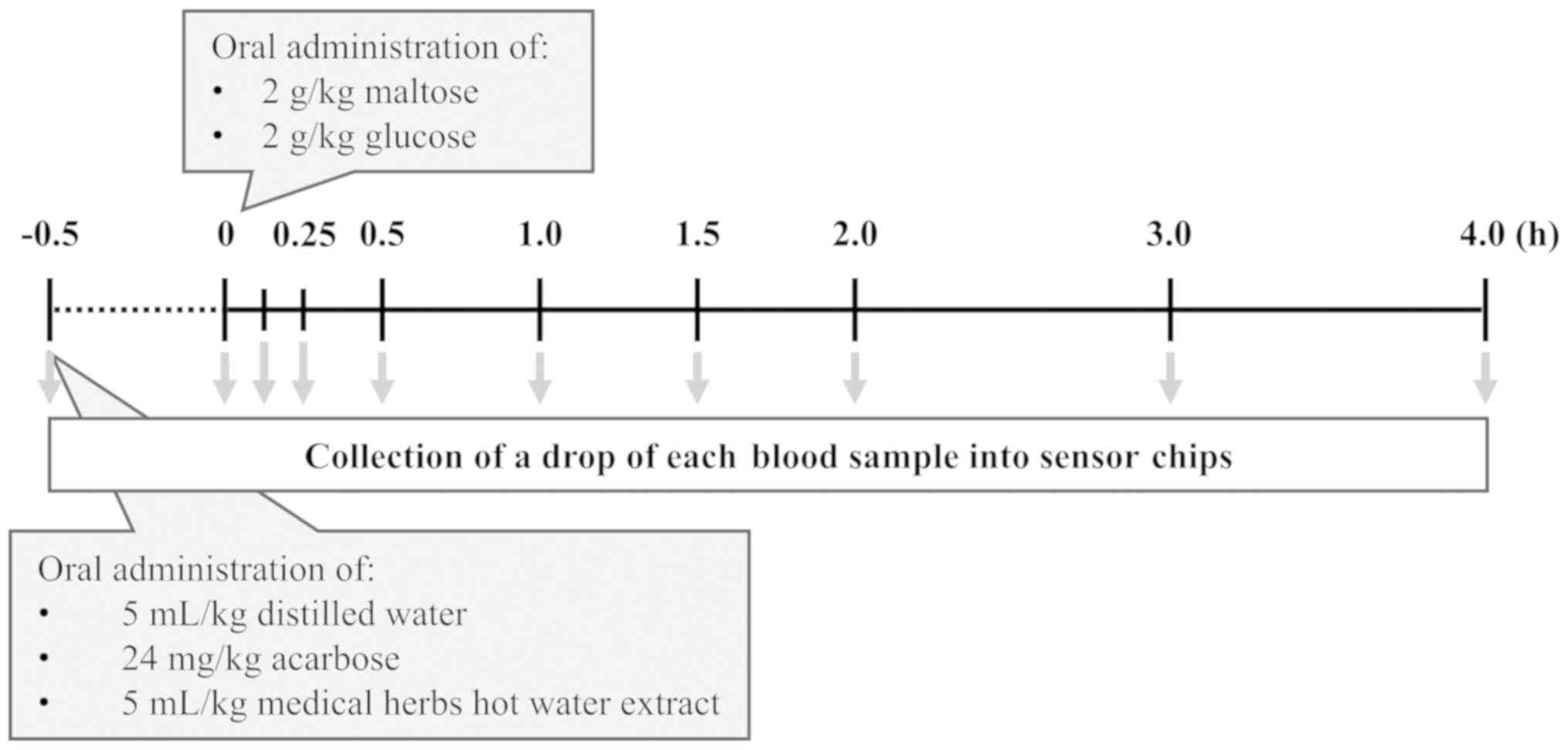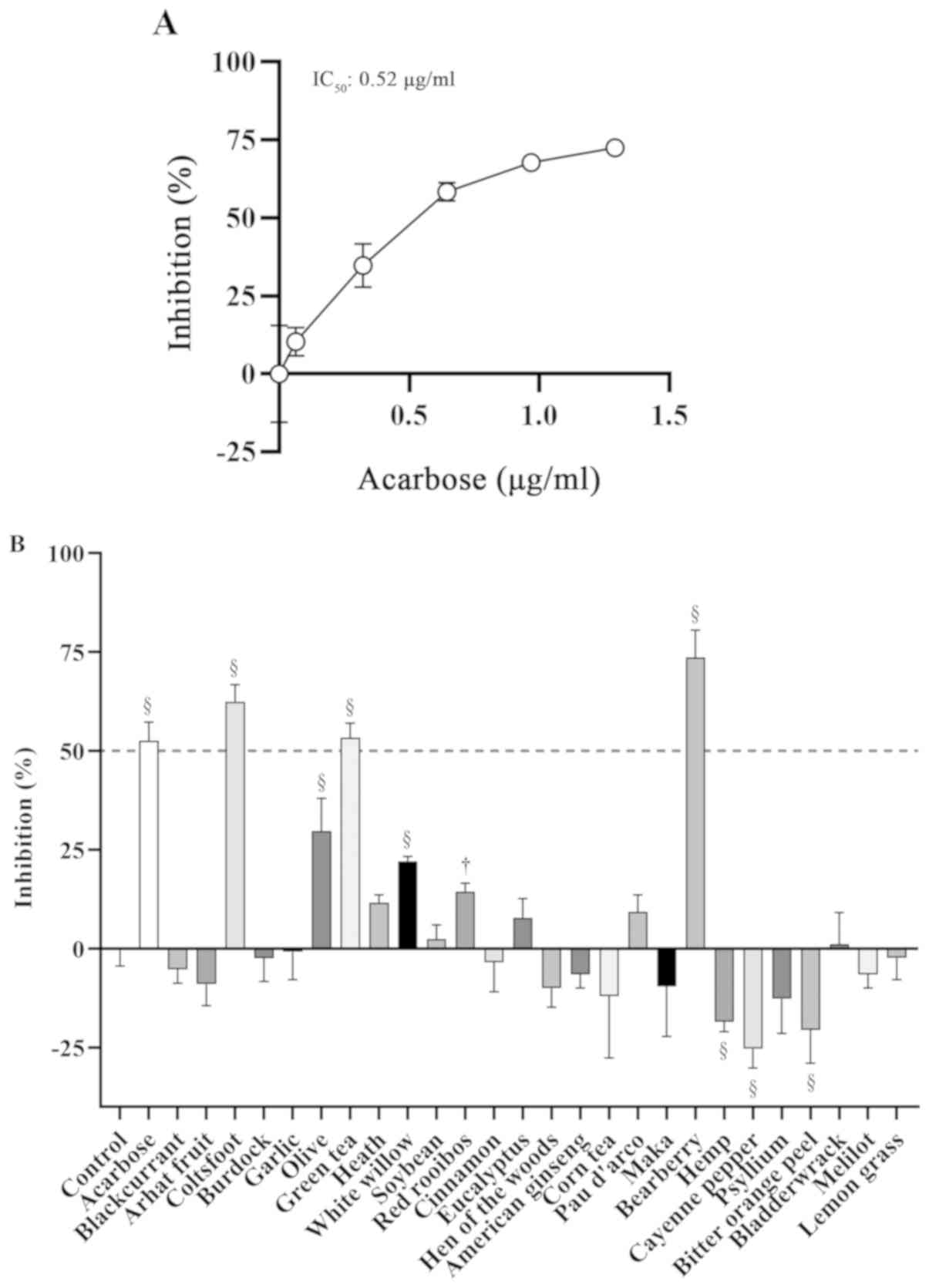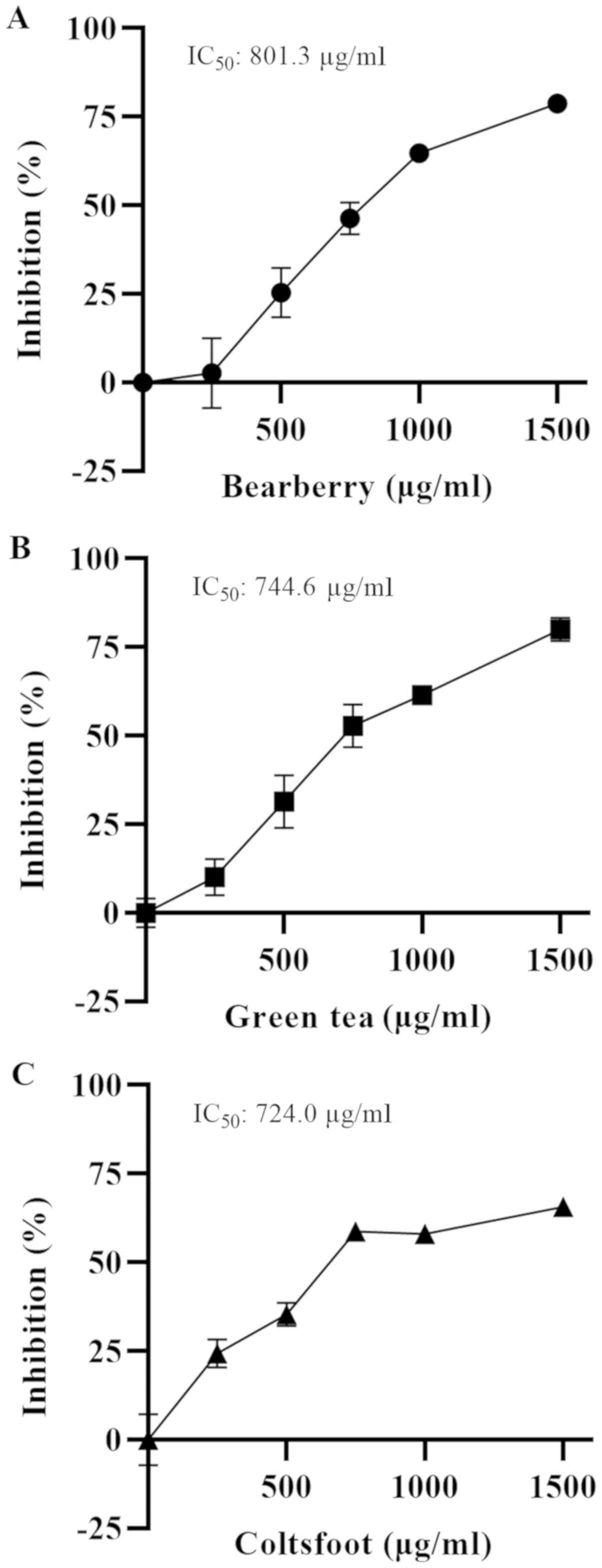|
1
|
Lebovitz HE: Alpha-glucosidase inhibitors.
Endocrinol Metab Clin North Am. 26:3525–551. 1997. View Article : Google Scholar
|
|
2
|
Rolo AP and Palmeira CM: Diabetes and
mitochondrial function: Role of hyperglycemia and oxidative stress.
Toxicol Appl Pharmacol. 212:167–178. 2006. View Article : Google Scholar : PubMed/NCBI
|
|
3
|
Puls W, Keup U, Krause HP, Thomas G and
Hoffmeister F: Glucosidase inhibition. A new approach to the
treatment of diabetes, obesity, and hyperlipoproteinaemia.
Naturwissenschaften. 64:536–537. 1977. View Article : Google Scholar : PubMed/NCBI
|
|
4
|
Liu Z and Ma S: Recent advances in
synthetic α-Glucosidase inhibitors. ChemMedChem. 12:819–829. 2017.
View Article : Google Scholar : PubMed/NCBI
|
|
5
|
Kawada Y, Miura M and Gomyo T: Inhibitory
effect of vegetables, fruits and herbs on α-glucosidase in an
immobilized enzyme assay system. Food Sci Technol Res. 12:275–277.
2006. View Article : Google Scholar
|
|
6
|
Kim JS, Kwon CS, Son KH and Kim JI:
Alpha-glucosidase inhibitory activities of some wild vegetable
extracts. J Food Sci Nutr. 5:174–176. 2000.
|
|
7
|
Morikawa T, Akaki J, Ninomiya K, Kinouchi
E, Tanabe G, Pongpiriyadacha Y, Yoshikawa M and Muraoka O:
Salacinol and related analogs: New leads for type 2 diabetes
therapeutic candidates from the Thai traditional natural medicine
Salacia Chinensis. Nutrients. 7:1480–1493. 2015. View Article : Google Scholar : PubMed/NCBI
|
|
8
|
Benalla W, Bellahcen S and Bnouham M:
Antidiabetic medicinal plants as a source of alpha glucosidase
inhibitors. Curr Diabetes Rev. 6:247–254. 2010. View Article : Google Scholar : PubMed/NCBI
|
|
9
|
Kikuchi H, Kogure S, Arai R, Saino K,
Ohkubo A, Tsuda T and Sunaga K: Rosehip inhibits xanthine oxidase
activity and reduces serum urate levels in a mouse model of
hyperuricemia. Biomed Rep. 6:539–544. 2017. View Article : Google Scholar : PubMed/NCBI
|
|
10
|
Ohkubo A, Chida T, Kikuchi H, Tsuda T and
Sunaga K: Effects of tomato juice on the pharmacokinetics of
CYP3A4-substrate drugs. Asian J Pharm Sci. 12:464–469. 2017.
View Article : Google Scholar : PubMed/NCBI
|
|
11
|
Sunaga K, Ohkawa K, Nakamura K, Ohkubo A,
Harada S and Tsuda T: Mechanism-based inhibition of recombinant
human cytochrome P450 3A4 by tomato juice extract. Biol Pharm Bull.
35:329–334. 2012. View Article : Google Scholar : PubMed/NCBI
|
|
12
|
Kikuchi H, Yuan B, Hu X and Okazaki M:
Chemopreventive and anticancer activity of flavonoids and its
possibility for clinical use by combining with conventional
chemotherapeutic agents. Am J Cancer Res. 9:1517–1535.
2019.PubMed/NCBI
|
|
13
|
Oki T, Matsui T and Osajima Y: Inhibitory
effect of alpha-glucosidase inhibitors varies according to its
origin. J Agric Food Chem. 47:550–553. 1999. View Article : Google Scholar : PubMed/NCBI
|
|
14
|
Serra-Barcellona C, Habib NC, Honoré SM,
Sánchez SS and Genta SB: Enhydrin regulates postprandial
hyperglycemia in diabetic rats by inhibition of α-glucosidase
activity. Plant Foods Hum Nutr. 72:156–160. 2017. View Article : Google Scholar : PubMed/NCBI
|
|
15
|
El SN and Karakaya S: Olive tree (Olea
europaea) leaves: Potential beneficial effects on human health.
Nutr Rev. 67:632–638. 2009. View Article : Google Scholar : PubMed/NCBI
|
|
16
|
Wainstein J, Ganz T, Boaz M, Bar Dayan Y,
Dolev E, Kerem Z and Madar Z: Olive leaf extract as a hypoglycemic
agent in both human diabetic subjects and in rats. J Med Food.
15:605–610. 2012. View Article : Google Scholar : PubMed/NCBI
|
|
17
|
Komaki E, Yamaguchi S, Maru I, Kinoshita
M, Kakehi K, Ohta Y and Tsukada Y: Identification of anti-α-amylase
components from olive leaf extracts. Food Sci Technol Res. 9:35–39.
2003. View Article : Google Scholar
|
|
18
|
Hadrich F, Bouallagui Z, Junkyu H, Isoda H
and Sayadi S: The α-glucosidase and α-amylase enzyme inhibitory of
hydroxytyrosol and oleuropein. J Oleo Sci. 64:835–843. 2015.
View Article : Google Scholar : PubMed/NCBI
|
|
19
|
McKay DL and Blumberg JB: A review of the
bioactivity of South African herbal teas: Rooibos (Aspalathus
linearis) and honeybush (Cyclopia intermedia). Phytother Res.
21:1–16. 2007. View
Article : Google Scholar : PubMed/NCBI
|
|
20
|
Santos JS, Deolindo CTP, Esmerino LA,
Genovese MI, Fujita A, Marques MB, Rosso ND, Daguer H, Valese AC
and Granato D: Effects of time and extraction temperature on
phenolic composition and functional properties of red rooibos
(Aspalathus linearis). Food Res Int. 89:476–487. 2016.
View Article : Google Scholar : PubMed/NCBI
|
|
21
|
Ulicná O, Vancová O, Bozek P, Cársky J,
Sebeková K, Boor P, Nakano M and Greksák M: Rooibos tea
(Aspalathus linearis) partially prevents oxidative stress in
streptozotocin-induced diabetic rats. Physiol Res. 55:157–164.
2006.PubMed/NCBI
|
|
22
|
Ayeleso AO, Oguntibeju OO and Brooks NL:
Impact of co-administration of red palm oil (Elaeis guineensis
Arecaceae) and rooibos (Aspalathus linearis Fabaceae) on
glycaemic parameters, liver function and key glycolytic enzymes in
diabetic rats. Trop J Pharm Res. 14:1613–1619. 2015.
|
|
23
|
Shara M and Stohs SJ: Efficacy and safety
of white willow bark (Salix alba) extracts. Phytother Res.
29:1112–1116. 2015. View
Article : Google Scholar : PubMed/NCBI
|
|
24
|
Head KA: Natural approaches to prevention
and treatment of infections of the lower urinary tract. Altern Med
Rev. 13:227–244. 2008.PubMed/NCBI
|
|
25
|
Huerta V, Mihalik K, Maitin V, Crixell SH
and Vattem DA: Effect of Central/South American medicinal plants on
energy harvesting ability of the mammalian GI tract. J Med Plant
Res. 1:38–49. 2007.
|
|
26
|
Swanston-Flatt SK, Day C, Bailey CJ and
Flatt PR: Evaluation of traditional plant treatments for diabetes:
Studies in streptozotocin diabetic mice. Acta Diabetol Lat.
26:51–55. 1989. View Article : Google Scholar : PubMed/NCBI
|
|
27
|
Boehm K, Borrelli F, Ernst E, Habacher G,
Hung SK, Milazzo S and Horneber M: Green tea (Camellia
sinensis) for the prevention of cancer. Cochrane Database Syst
Rev. 2009:CD0050042009.
|
|
28
|
Yang X and Kong F: Evaluation of the in
vitro α-glucosidase inhibitory activity of green tea polyphenols
and different tea types. J Sci Food Agric. 96:777–782. 2016.
View Article : Google Scholar : PubMed/NCBI
|
|
29
|
Snoussi C, Ducroc R, Hamdaoui MH, Dhaouadi
K, Abaidi H, Cluzeaud F, Nazaret C, Le Gall M and Bado A: Green tea
decoction improves glucose tolerance and reduces weight gain of
rats fed normal and high-fat diet. J Nutr Biochem. 25:557–564.
2014. View Article : Google Scholar : PubMed/NCBI
|
|
30
|
Chacko SM, Thambi PT, Kuttan R and
Nishigaki I: Beneficial effects of green tea: A literature review.
Chin Med. 5:132010. View Article : Google Scholar : PubMed/NCBI
|
|
31
|
Oh J, Jo SH, Kim JS, Ha KS, Lee JY, Choi
HY, Yu SY, Kwon YI and Kim YC: Selected tea and tea pomace extracts
inhibit intestinal α-glucosidase activity in vitro and postprandial
hyperglycemia in vivo. Int J Mol Sci. 16:8811–8825. 2015.
View Article : Google Scholar : PubMed/NCBI
|
|
32
|
Venables MC, Hulston CJ, Cox HR and
Jeukendrup AE: Green tea extract ingestion, fat oxidation, and
glucose tolerance in healthy humans. Am J Clin Nutr. 87:778–784.
2008. View Article : Google Scholar : PubMed/NCBI
|
|
33
|
Tsuneki H, Ishizuka M, Terasawa M, Wu JB,
Sasaoka T and Kimura I: Effect of green tea on blood glucose levels
and serum proteomic patterns in diabetic (db/db) mice and on
glucose metabolism in healthy humans. BMC Pharmacol. 4:182004.
View Article : Google Scholar : PubMed/NCBI
|
|
34
|
Nishiumi S, Bessyo H, Kubo M, Aoki Y,
Tanaka A, Yoshida K and Ashida H: Green and black tea suppress
hyperglycemia and insulin resistance by retaining the expression of
glucose transporter 4 in muscle of high-fat diet-fed C57BL/6J mice.
J Agric Food Chem. 58:12916–12923. 2010. View Article : Google Scholar : PubMed/NCBI
|
|
35
|
Yang CS, Wang H and Sheridan ZP: Studies
on prevention of obesity, metabolic syndrome, diabetes,
cardiovascular diseases and cancer by tea. J Food Drug Anal.
26:1–13. 2018. View Article : Google Scholar : PubMed/NCBI
|
|
36
|
Roeder E: Medicinal plants in Europe
containing pyrrolizidine alkaloids. Pharmazie. 50:83–98.
1995.PubMed/NCBI
|
|
37
|
Uysal S, Senkardes I, Mollica A, Zengin G,
Bulut G, Dogan A, Glamočlija J, Soković M, Lobine D and
Mahomoodally FM: Biologically active compounds from two members of
the Asteraceae family: Tragopogon dubius Scop. and
Tussilago farfara L. J Biomol Struct Dyn. 37:3269–3281.
2019. View Article : Google Scholar : PubMed/NCBI
|
|
38
|
Gao H, Huang YN, Gao B, Xu PY, Inagaki C
and Kawabata J: α-Glucosidase inhibitory effect by the flower buds
of Tussilago farfara L. Food Chem. 106:1195–1201. 2008.
View Article : Google Scholar
|
|
39
|
Sun J, Yu JH, Zhang JS, Song XQ, Bao J and
Zhang H: Chromane enantiomers from the flower buds of Tussilago
farfara L. and assignments of their absolute configurations.
Chem Biodivers. 16:e18005812019. View Article : Google Scholar : PubMed/NCBI
|



















